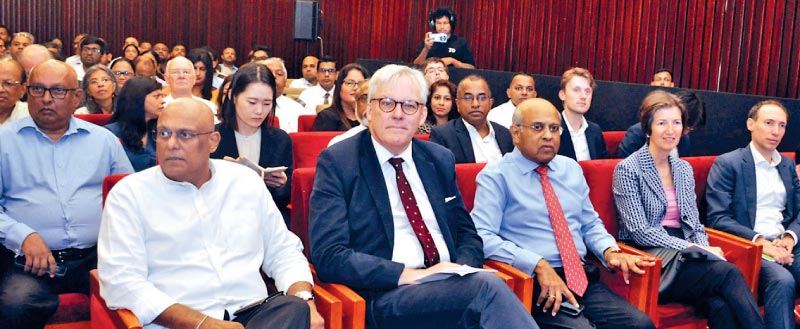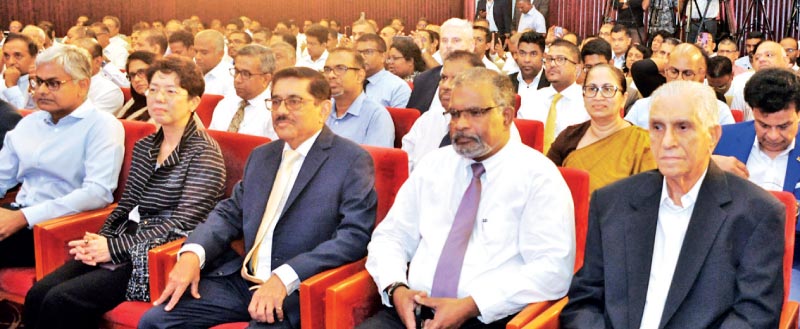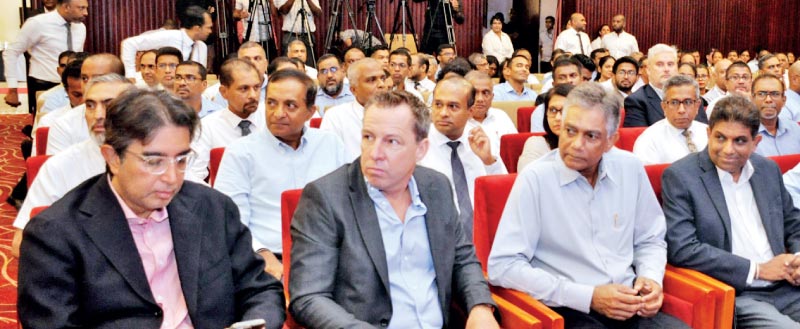Monday Dec 15, 2025
Monday Dec 15, 2025
Monday, 2 September 2024 00:40 - - {{hitsCtrl.values.hits}}
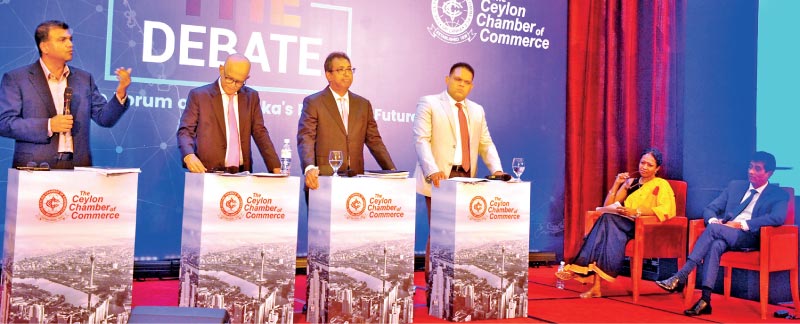
In the run up to the 2024 Presidential election, economic policy experts representing four main candidates, laid out their competing economic visions for Sri Lanka’s future at a groundbreaking debate, the first of its kind organised by the Ceylon Chamber of Commerce last week.
Titled “Defining the Vision – THE Debate”, the event featured presentations by Shehan Semasinghe representing independent candidate Ranil Wickremesinghe, Dr. Harsha de Silva for Samagi Jana Balawegaya (SJB) candidate Sajith Premadasa, Dr. Harshana Suriyapperuma for National People’s Power (NPP) candidate Anura Kumara Dissanayake, and Prof. Ranjith Bandaranaike for Sri Lanka Podujana Peramuna (SLPP) candidate Namal Rajapaksa.
Held at the BMICH, the debate attracted a packed audience of business leaders, professionals, academics and civil society members, eager to hear firsthand how each candidate plans to steer Sri Lanka’s future.
Over the course of three rounds, the experts presented their policy frameworks and faced tough questions form the moderators — Ceylon Chamber of Commerce Chairman Duminda Hulangamuwa and Board Member Kasturi Chellaraja, whilst in the final round each of the experts were allowed to pose a question or two from the representatives, offering voters a glimpse into the direction each candidate might take the economy if elected.
Following are the excerpts from the debate;
By Charumini de Silva
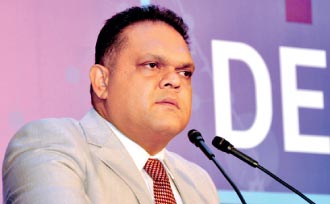 |
|
— Shehan Semasinghe — |
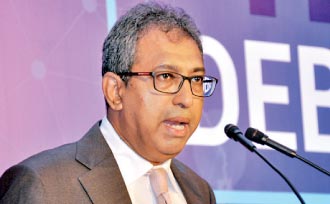 |
|
— Dr. Harsha de Silva — |
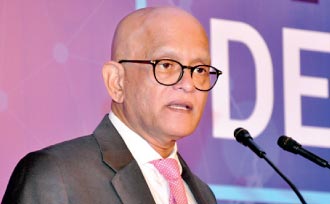 |
|
— Prof. Ranjith Bandara — |
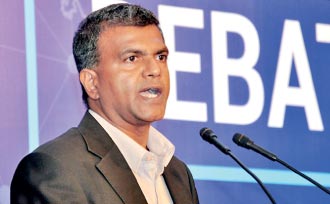 |
|
— Dr. Harshana Suriyapperuma — |
Round 1
Duminda: In your presentation, you discussed the stability achieved over the past two years, but what different growth strategies do you have in mind? What specific steps does your party plan to take to drive economic growth if elected?
Shehan: We are on track to reach around 4% growth this year, with the ongoing reforms. Sri Lanka has faced crises before, leading us to the IMF 16 times. Typically, once stability is reached, there is a tendency to revert to previous practices. We need to break this cycle; none of us want to face an 18th IMF program, which would be even tougher. To address this, we have introduced the Economic Transformation Act, which sets targets and hold the Government accountable to Parliament, aiming to maintain stability and growth. Growth is crucial, but Stalin’s is equally important. You cannot have one without the other and our results prove that we can maintain both.
Our aim is to achieve 7% growth rate in the economy to compensate for the recent GDP decline and stabilise the country completely. We estimate this will take us another 12-15 months, after which we can expect a secure and promising economic foundation. We also plan to focus less on fiscal and monetary stimulus and more on productivity increases. We have already introduced new economic Zones and are pursuing new Free Trade Agreements (FTAs), including a finalised one with Thailand and ongoing discussions with India on Economic and Technical Co-operation Agreement (ETCA), which is no at the final stages.
The Economic Transformation Act also includes a Productivity Commission to boost productivity in firms engaging with export markets and facing import competition. Additionally, we are working on National Single Window process and a National Tariff Policy to assist the interests of exporters, importers and consumers. An agricultural modernisation program will be a key area of focus along with land ownership program of Urumaya to stimulate growth.
Kasturi: Your candidate mentioned renegotiating the IMF if elected. You discuss public sector salary adjustments and there was a mention of providing Rs. 20,000 either as Aswesuma or gratis. Can you clarify which parameters you intend to renegotiate, specifically regarding revenue to GDP ratio, cross financing means and achieving primary account surplus, while still ensuring debt sustainability?
Dr. Harsha: To be frank, we are the ones who advocated for seeing IMF assistance back in August 2020, urging action before the country went bankrupt. Initially, our concerns were dismissed with claims of having ‘home-grown solutions’ by the former President’s economic advisers, which clearly did not exist. We have since learned from these mistakes and while we support the IMF program, our party believes certain adjustments are necessary. The graph I showed highlighted how other emerging markets have been increasing their contribution to global production, whereas Sri Lanka’s contribution has declined significantly.
Our economy is one of the most closed economies in the world. We need to shift from an import substitution model and remove anti-tradable biases to achieve sustainable growth. Once elected, we will have the flexibility to make necessary adjustments without deviating from the IMF program. We are committed to responsible fiscal and monetary policies, avoiding excessive money printing and keeping interest rates realistic. Our leadership team understands both local and international economic dynamics and is dedicated to reducing poverty and creating economic opportunities for all Sri Lankans.
Duminda: From what I gathered from your presentation, it seems you are still advocating for a large Government role. Given the current financial constraints, can we really afford to continue with a policy that emphasises a large State and public sector-left infrastructure development?
Prof. Ranjith: I think there is a misunderstanding. Our approach is an integrated growth model that prioritises State involvement, but is centred on national interest, economic growth, social progress and environmental sustainability. These elements are interrelated and cannot be addressed in isolation. For instance, economic growth requires holistic approach integrating social and environmental considerations. The concern seems to be about repeating past mistakes, but this model is not just about State dominance. Our policy focuses on four main pillars: State priority, innovation, investment and freedom.
Innovation is crucial across sectors like agriculture, manufacturing and services. We also emphasised investment in entrepreneurship, human resource development and research commercialisation. Our policy framework evolves around Mahinda Chinthanaya, which was proven effective from 2005-2015 and ensures essential infrastructure development. What is meant by freedom includes economic, political, cultural and religious. Religious freedom is also vital. It is not just about economic policy, but ensuring well-rounded perspective for holistic development. This does not mean we are promoting a return to excessive State control, rather we advocate for a strengthened and efficient State mechanism to drive growth.
Duminda: Your presentation seemed more critical of others than focused on what your policies would achieve. Although your recently released manifesto detailed, people are concerned about adjusting the Debt Sustainability Analysis (DSA). If the DSA is modified and the IMF does not approve, won’t this risk collapsing the program? What exactly would you renegotiate with the IMF to adjust these parameters?
Dr. Harshana: I did not delve much into content details because our manifesto is publicly available, unlike those of other parties. We are just less than 20 days behind the election, yet some parties have not released their manifestos, which leaves us speculating about their plans. Regarding the IMF and the DSA, it is essential for any country to have its own assessment model based on its economic projections, external sector behaviour and refinancing plans to maintain sustainability. While we adhere to the IMF program, we believe having our own DSA, incorporating input from industry experts is crucial for discussions. During the several rounds of our discussions, we have made it clear to the IMF that we will not deviate from the existing program.
However, we want to base our negotiations on a credible plan that includes addressing revenue leakages and managing expenses more effectively. Our DSA will serve as the foundation for these discussions, highlighting areas like revenue collection
inefficiencies and institutional weaknesses. From the discussions we had so far, the IMF has indicated that their acceptance would depend on the credibility of our proposed program and our revenue generation plans. We have already highlighted issues like revenue leakages from corruption, such as the sugar scandal and inefficiencies in Government institutions like Sri Lanka Customs, Inland Revenue Department and Excise Department. Fixing these issues requires a political culture change, not just leadership changes.
Round 2
Kasturi: One of your election promises was to adjust public sector salaries, citing the need to address existing discrepancies. However, a Rs. 10,000 adjustment would cost the Government Rs. 156 billion annually, which is more than last year’s total revenue of Rs. 144 billion. Additionally, there’s been an announcement about reducing the PAYE tax. In light of these factors, how do you plan to meet primary and fiscal targets?
Shehan: All our announcements are aligned with the 2.3% primary balance target and we will not deviate from that. The tax revisions announced by the President have been under discussion since September 2023. We recognise the need to create fiscal space and that economic growth benefits the public. Our proposal keeps the tax-free threshold at Rs. 1.2 million annually, increased the tax bands from Rs. 50,000 to 720,000 and maintains the marginal tax rate ay each band at 6%, with the top rate at 36%. The expected tax relief targets the middle income bracket, with reductions ranging from 20% for those earning Rs. 200,000 monthly to 23% for those earning Rs. 400,000. This relief will cost around 0.07% of GDP and we will implement compensating measures to avoid further burdening the general public.
Regarding public sector salaries, we have been discussing with the IMF for over a year, acknowledging that the sector salaries are lower compared to the private sector. We believe salary adjustments are necessary, especially as the economy shows signs of recovery, with a growth rate of 4% against a 2% predicted. The public sector salary increase, which will require about Rs. 250 billion is planned for implementation from January 2025 and is being included in the upcoming Budget.
Duminda: Your candidate had pledged to write off farmers’ debts and provide a Rs. 20,000 subsidy to poor families. If farmers’ debts are written off, who will absorb the financial loss? Will it be banks or the Government? And what kind of fiscal space do you have for these measures?
Dr. Harsha: We need to recognise the realities on the ground. Many farmers are sowing, have to mortgage their tractors and rotors just to continue the crop cycle. Additionally, many micro, small and medium enterprises (MSMEs) were given a debt extension until 15 December, following pressure from Sajith Premadasa on the parate issue. But what happens after 15 December? There are people struggling to make ends meet. It is essential for the Government to take care of its citizens.
I have seen a mother in my electorate buying just a tablespoon of milk order because they cannot afford more. This is the reality of this country. We must ensure people are treated as first-class citizens, not left to get by on mere crumbs. Every proposal from Sajith Premadasa is backed by revenue plans. We will not spend a single rupee without showing where the money is coming from. Research has shown potential revenue resources and cost estimates and we assure transparency.
Kasturi: In the past, successive Governments have claimed they would boost revenue on paper, but practical implementation is often lacking. How do you plan to actually make these happen?
Dr. Harsha: The key is digitalisation. If India can implement systems like Aadhaar, where even a betel leaf seller can use a QR code for transactions, then so can we. Consider the withholding tax on interest—many people evade or underreport. This is the reality. With digitalisation, we can collect revenue at the source without overburdening the public, whilst improving compliance.
Duminda: Many candidates have promised to tackle corruption with laws and bills, but corruption persists. How will you all improve cosmic governance and transparency? What will you do differently?
Prof. Ranjith: Tackling corruption requires more than just laws; it needs widespread public support. Although legal measures can help manage corruption, they are not enough on their own. We need a comprehensive strategy to prevent corruption, which involves education and societal awareness from a young age. During our schooling days, we have not even heard of corruption. The focus should be on fostering a culture where citizens act as watchdogs and whistleblowers. Previous efforts, like the FCID, became politicised, leading to only few tangible results. Our policy will prioritise a corruption-free society as a State priority.
Kasturi: You mentioned that in the private sector, managers who do not perform are let go. There is scepticism about the NPP’s ability to govern, given its lack of prior experience in power. How can you address these concerns?
Dr. Harshana: It is a fair question, but consider the track record of those who have been in power—proven corruption, incompetence and disregard for citizens’ welfare. In contrast, the NPP has a clean record in terms of corruption. We have a capable team with professionals from various sectors, including Government service, academia, engineering, law and international experience. The leaders must demonstrate integrity and political will to bring about change that people are yearning for. It is just not just about experience in power, but the willingness to act ethically and effectively. When selecting a candidate, you look at their history and capabilities, just as you would when hiring for a private sector job. Some of our representatives have already proven that loss making State owned enterprises (SOEs) can be turned around. They have done it within a short span of 14 months, during their time in power.
Kasturi: You did not answer proper. How will you navigate the challenges of governance without prior experience?
Dr. Harshana: It all comes down to political will and ethical leadership. Leaders must lead by example, not just words. Our team has substantial experience across various fields and countries, which equip us to handle governance effectively. Change requires commitment, and the NPP is prepared to demonstrate that commitment by bringing ethical, competent leadership to the forefront.
Final Round
Shehan: Your policy document mentions renegotiating the DSA. In our experience, we have successfully implemented an IMF program that is now showing results. Given that the IMF program revolves around the current DSA, how confident are you that your proposed changes to the DSA will be accepted by the IMF? If the IMF rejects these changes, what will you do?
In my opinion, renegotiating could derail our progress, forcing us to end the current IMF program and start over, which could take another two years. So, can the country afford this delay? Also, how will you ensure that your program is credible and deliver results, especially when we have seen examples like the Maldives facing economic issues by relying on expected revenues?
Dr. Harshana: I will explain again in simple terms. When the IMF presented the DSA to Sri Lanka, it was based on the past 16 times experience where corruption among politicians and State officials derailed efforts. The IMF’s DSA assumes rampant corruption, so it is cautious.
Shehan: That is not the point. How will you change the DSA and what if the IMF refuses?
Dr. Harshana: We have discussed with the IMF that under a new leadership and culture, we will handle revenue generation, expense management and savings differently. The IMF has indicated they are open to further discussions when we are in power. This is not about derailing the program but about providing relief to people within the broader parameters.
Dr. Harsha: What is your stance on Central Bank independence, considering you voted against it?
Dr. Harshana: We support independence for the Central Bank and all State institutions. Independence is not just a nameplate but about appointing competent, ethical individuals who can resist political pressure and fulfil their mandates. This is what I argued earlier, under the previous Central Bank law, what was the provision that prevented the Monetary Board members refusing to print money when political pressure was applied? There are many other members to override the request from one member and the Chief of the Monetary Board failed in his role to act. This is what we need to change.
Dr. Harsha: But you voted against the Central Bank independence. Will you repeal the Act?
Dr. Harshana: We will not repeal the Act. Instead, we will strengthen it to ensure real independence.
Kasturi: Your manifesto mentions influencing interest rates. How will your political party’s interest rate policies be implemented effectively through these institutions?
Dr. Harshana: Our policies are based on the public mandate. While implementing them, we will work closely with State institutions, considering their feedback and involving experts. Our goal is to have policies implemented effectively through these institutions.
Dr. Harsha: Will you repeal the Central Bank Act? A simple yes or no?
Dr. Harshana: It is not that simple. Our commitment is to support Central Bank independence and that of all institutions, including the Treasury. The calamity we face is due to years of political interference and our goal is to remove this politicisation.
Dr. Harsha: You can make Central Bank independent. You can never make the Treasury independent. If you are going to make the Treasury independent, how do you intend to achieve institutional independence?
Dr. Harshana: Independence means eliminating political interference, empowering qualified professionals to lead and letting State institutions carry out their roles effectively. The Government will act based on the people’s mandate, working with these institutes to implement policies.
Prof. Ranjith: There have been reports that your leader promises to pay off debts. Can you explain how?
Dr. Harshana: The debt mountain we are facing now is a result of what you all have created. Our plan involves preventing financial leakages in Government and gradually bring the informal economy into the formal economy and encouraging tax compliance. At present, only 40% of potential taxpayers are contributing. We aim to expand this tax net and base. By eliminating wasteful Government spending and aiming for ambitious targets like $ 45 billion exports by 2030, we will generate necessary revenues. We also plan to attract Foreign Direct Investments (FDIs) without corruption or kickbacks, creating a stable economic environment to manage debt effectively.
Dr. Harshana: I have two questions for the opposition. First, back in 2020, the opposition kept saying, “Go to the IMF.” But when you were in power, didn’t you realise that we were facing unsustainable debt? A few months, or even a year before the change of Government, you borrowed heavily despite knowing that the debt situation was unsustainable and that funds were only covering interest payments. Wasn’t there a contingency plan to approach the IMF back then? Why did the urgency to go to the IMF only arise once the Government changed?
Dr. Harsha: Firstly, the late Mangala Samaraweera did substantial work to address the debt problem. In 2018, we had a Medium-Term Debt Management Strategy (MTDMS), but a political crisis disrupted its implementation. Even in November 2018, the IMF found our debt still sustainable. However, policy missteps, like tax cuts led to further issues. When Dr. Coomaraswamy took over as the Governor of the Central Bank in 2015, we had around $ 8.2 billion in reserves, which included $ 3.5 billion of hot money and $ 2.5 billion in short-term swaps. This short-term money needed to be converted to longer term debt. We issued international sovereign bonds to stabilise reserves. By the time Government changed in 2019, reserves were down to $ 7.6 billion, with short-term hot money and swaps making up less than $ 600 million. From 2015-2019, around 89.8% of the money borrowed was used to pay interest on pre-2015 loans.
In 2019, I met with Mangala and Dr. Coomaraswamy to discuss with the IMF how to adjust our program to deal with these issues. We understood the debt problem was not sudden but a longstanding issue. The real problem is that we have not focused on sustainable growth, primarily through export expansion and import substitution. We need credible growth strategies to resolve our debt issues. It is crucial that voters make informed choices and avoid being swayed by false promises.
Dr. Harshana: Regarding the opposition leader’s relief proposals, including reducing fertiliser prices to around Rs. 3,000 and increasing Government salaries to a minimum of Rs. 57,500 what are the estimated costs and how do you plan to finance these measures?
Dr. Harsha: Currently, a bag of fertiliser costs between Rs. 8,000 to Rs. 10,000. We plan to provide it at Rs. 5,000 which results in about Rs. 60,000 in subsidies per year for a farmer with two hectares of paddy. Additionally, we plan to double the Aswesuma social security payment from Rs. 5,000 to Rs. 10,000 for 960,000 people and maintain the current Rs. 15,000 payment for another 1.8 million people. Our comprehensive relief package, including living allowances, salary adjustments and subsidies, will cost under Rs. 200 billion. We will generate this revenue through adjustments in withholding tax, excise duties, property taxes and other levies.
Contrary to concerns, our highest marginal tax rate will remain at 36%, not 24%. We aim to provide relief to middle-income earners while maintaining direct tax contributions. We are not planning to remove 100,000 taxpayers by increasing the threshold from Rs. 100,000 to Rs. 200,000. It is about reasonable tax rates that people can afford for services like education, healthcare and security. We are committed to maintaining the IMF’s DSA framework rather than imposing a new one, knowing the IMF’s refusal would risk program success.
Dr. Harshana: You mentioned having a manifesto blueprint debated in Parliament, but Dr. Godahewa noted that it was not signed by your party leader. Which version should we consider valid?
Dr. Harsha: As the Head of the Economic Team for the SJB, I can confirm our manifesto has been public since February 2023 — not today. It represents our official stance and plans.
Pix by Lasantha Kumara
